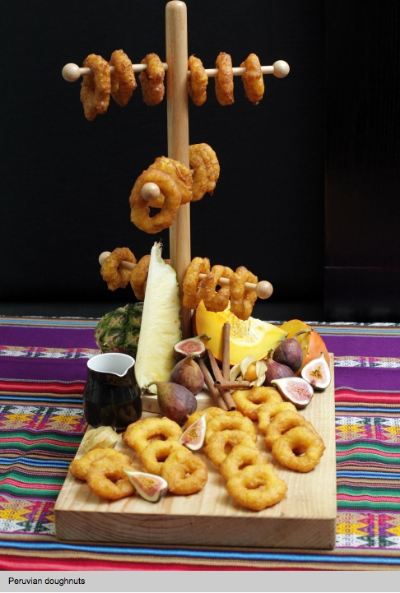our favorite finds from the front lines of food
Peruvian food (like the excellent doughnuts at right) is on the rise in Hong Kong "When Hong Kong does eventually catch up, it may come as a surprise just how much local and Japanese influence there is on that far away country's cuisine." (South China Morning Post)
Bring on the Haggis! Scotland to petition US to bring back haggis UK environment secretary to ask opposite number to end decades-old ban and import meat dish once again Maybe haggis should come with video instruction for the intimidated. (Guardian)
Ritz-Carlton Thailand is creating how-to, interactive cooking videos tutorials for guest to use in their home kitchens as a way to continue the guest experience and build brand loyalty.
(Luxury Daily)
The big guys go small as some mega-retailers try out the small grocery store model (Seafood Source)
A Museum Devoted to Roast Duck Opens in Beijing Discover the culinary history of roast duck through sculptures and imitation dinners at the newly-opened (First We Feast)
Prince Charles wants to turn fisheries into investment opportunities New report from prince's sustainability unit says investment in fisheries could be an effective way of saving the world's oceans "It is now time to explore a new approach to investing in the transition, an approach which involves all types of financial capital – from philanthropic to public to private. Each can play an important role and through coordination and integration, different types of capital can work together to finance the transition to self- sustaining fishery systems.” (Guardian)
Baijiu is coming to America, but will the popular Chinese liquor go down smooth? Some people consider it a drink. Some people consider it a form of hazing. "Broadly speaking, Chinese baijiu is a type of super-strong booze distilled usually from sorghum, but other grains as well. It might be medicinal, or not." (The World /PRI)
Whisky, on the other hand, is so popular that fraud is costing the industry. Whisky detective hunts and exposes sham drams “Water that falls in the Cairngorms is different from water that falls in the Lowlands, and water that falls in Islay is different to water that falls in Orkney. And we can measure the difference. We’ve mapped out the isotopic fingerprint of all the fresh water in Scotland – we call it the isoscape.” (Scotsman)


